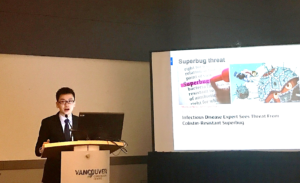- ‘We need to be cautious not to romanticise communities as resilient, when what they are doing is coping in difficult situations.
- ‘Health systems resilience needs to be qualified by an explicit focus on equity and social justice, and support the empowerment of the most vulnerable.’
These were among the key reflections to emerge from the Fourth Global Symposium on Health Systems Research and welcomed by our COMDIS-HSD delegates who joined thousands at this key date in the global health calendar.
Held in Vancouver earlier in November, HSR 2016 took place over a packed 5 days of formal sessions, oral presentations, skill building events and social media sharing. COMDIS-HSD partners from ARK in Bangladesh, GHRD in China and Malaria Consortium took a frontline role, giving well-received presentations on 3 of our projects to improve rational prescribing and effective use of antibiotics.
ARK’s Dr Rumana Huque described our study to promote appropriate prescribing of antibiotics in children under 5 by health workers at community clinics in Bangladesh. The study shows that using specially-adapted job aids and interactive training, community health workers can correctly prescribe antibiotics in 89% of cases. See her full presentation here.
Dr Huque also told delegates that this, like all COMDIS-HSD research, follows the embedded approach – involving the Ministry of Health and other stakeholders right throughout the study design, implementation and subsequent national scale-up. Delegates learned that 1,200 doctors and 14,000 community health workers have now been trained to use the Integrated Management of Childhood Illness (IMCI)-based job aid and ‘how to diagnose and treat’ guidelines.
Delegates and world experts responded enthusiastically to a presentation on our work to reduce irrational antibiotic prescribing among children with upper respiratory tract infections (URTIs) in rural China.
GHRD Director Zhitong Zhang set the scene by informing delegates that antibiotic consumption per capita is 10 times higher in China than the United States. He went on to describe how our multi-faceted intervention package – including evidence-based guidelines, peer review of prescriptions and health education materials – has been effective in reducing antibiotic prescribing for childhood URTIs in China’s rural primary care facilities. Our full study and detailed data is due to be published shortly.
Helen Counihan, Technical Director of Malaria Consortium, spoke about our work in Zambia to assess the capacity of community health workers (CHWs) to diagnose and prescribe for pneumonia in children under 5. She shared encouraging findings that show CHWs are capable of correctly measuring respiratory rates and providing appropriate treatment – with high agreement between their decisions and those of experts.
Summing up after the presentations, COMDIS-HSD partner and session chair, Professor Xiaolin Wei, said: ‘Participants praised our trial in China, which reached 30% reduction of absolute antibiotic prescribing rates.
‘But across all our antimicrobial resistance (AMR) study settings, there are commonalities we can all learn from:
- it is crucial to develop guidelines for clinicians (either doctors, nurses or community health workers) and build training and evaluation into the process of care;
- and while there are huge challenges, it is not as difficult as we often anticipate to reduce antibiotic use using relatively cheap and cost effective interventions.’
COMDIS-HSD delegates also engaged in the work of RiNGs, a cross-research programme consortium group that focuses on gender and ethics in research. Our team participated in workshops on gender analysis, as well as critical discussions on intersectionality and rights-based research.
Leeds-based COMDIS-HSD researcher Rebecca King said: ‘These events reminded me of how critical it is to engage with gender and other inequities throughout the research process and to take into account multiple perspectives.’
Reflecting on HSR 2016, COMDIS-HSD Consortium Manager Anthonia James said: ‘This year’s symposium was full on but incredibly energising.
‘The concluding statement from the event highlights that resilient and responsive health systems are ones which provide integrated, people-centred services, with primary health care as the frontline. Integrated services that are delivered as part of routine primary care are at the centre of everything we do at COMDIS-HSD and that puts us in an exciting position going forward.’
Find out more:
- See our video briefing ‘How can we make community clinics more effective in Bangladesh?’
- See our journal article ‘Rational use of antibiotics by community health workers and caregivers for children with suspected pneumonia in Zambia’



